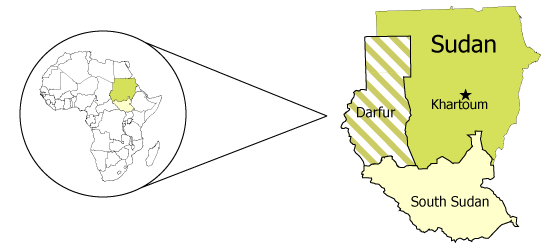The rights group Human Rights Watch (HRW) says that more than 200 women and girls were raped by members of the Sudanese army in a 36-hour assault on
The rights group Human Rights Watch (HRW) says that more than 200 women and girls were raped by members of the Sudanese army in a 36-hour assault on the north Darfur town of Tabit beginning on October 30, 2014.
Euronews spoke with the Sudanese president Omar al Bashir about the report.
“This basically is not a report, but it’s a radio news item from Radio Dabanga which is hostile to us,” said al Bashir.
Who is Omar al-Bashir?
- Born in 1944 when Sudan was under Anglo-Egpytian control.
- Pursued a military career and served in the Egyptian army in the Arab-Israeli war in 1973. He was also involved in the fighting against armed groups from southern Sudan in the early days of the civil war.
- Took control of Sudan, then Africa’s largest country, in a military coup in 1989, later appointing himself president.
- Became the first sitting head of state to be indicted by the International Criminal Court on charges of mass killing and rape in Darfur.
“It’s opposition-run, and its Israeli-funded,” he continued. “The United Nations responded to the news by sending a group of investigators to Thabit village . This UN group investigated the charges and confirmed that the information in the report was incorrect. Then they returned and wrote a report confirming that the information in the report was incorrect and no rape had taken place.”
But the US Ambassador to the UN Samantha Power has sharply criticised Sudan for what she described as “shamefully denying the United Nations the ability to properly investigate this incident.”
The council, she said, had to rely on investigations by non-government organisations like HRW because Khartoum had “systematically denied meaningful access” to the UN-African Union peacekeeping mission in Darfur (UNAMID).
“To this day, the government of Sudan has shamefully denied the UN the ability to properly investigate this incident,” Power told the 15-nation council.
She spoke after the council extended for a year the mandate of a UN expert panel that monitors compliance with a UN arms embargo and other Darfur sanctions. The unanimously adopted council resolution also threatened to add anyone involved in attacks on UNAMID to a UN sanctions blacklist.
Sudanese Deputy Ambassador Hassan Hamid Hassan dismissed the HRW report and Power’s speech as “a flagrant attempt to level accusations.”
He added that UNAMID had never blamed Khartoum for Tabit rapes and the peacekeepers “were not denied access.” Sudan denies the incident took place.
The United Nations has repeatedly said UNAMID was denied access. It has also said rape has been used as a weapon of war in Darfur.
HRW’s Philippe Bolopion told reporters that lack of access was no reason for not conducting a UN investigation. He said his group spoke with victims and other credible sources by telephone to gather evidence.
UN spokesman Stephane Dujarric said the UN needed full access to conduct a proper investigation.
During Thursday’s council meeting, Power cited the deterioration of the situation in Darfur and elsewhere in Sudan, such as South Kordofan, and accused the government of openly violating the arms embargo.
“For every Thabit we know about, there are so many more villages that have been the victims of unspeakable atrocities over the past decade in Darfur,” Power said.
The Darfur conflict began in 2003 when mainly non-Arab tribes took up arms against the Arab-led government in Khartoum, accusing it of discrimination.
REPUBLIC OF THE SUDAN
- Between 1899 and 1956, Sudan (incorporating modern-day South Sudan) was under joint British and Egyptian administration although in practice, as Egypt was a protectorate of Britain at the time, Britain maintained de facto control of Sudan.
- Egypt surrendered its theoretical sovereignty over Sudan following the 1952 Egyptian Revolution, a tactic designed by Egyptian nationalists to force Britain into relinquishing its control of Sudan. This succeeded and Sudan became an independent state – Africa’s largest until South Sudan’s independence – on January 1, 1956.
- Darfur – When Britain and Egypt took sovereignty over Sudan in 1899 they allowed the region of Darfur to run itself as an independent sultanate. However in 1916 Britain incorporated Darfur into Sudan to prevent it falling into the hands of the Ottoman Empire in World War I.
- South Sudan gained independence from Sudan on July 9, 2011, six months after a referendum in which 98.83% of the electorate in southern Sudan voted in favour of secession.
IN FIGURES

- Size: 1.86 million km2
- Population: 37.29 million (July 2014 estimate)
- GDP per capita: $1,793
- Median age: 19.1 years
- Literacy rate: 71.9%
- Religions: Sunni Muslim, small Christian minority
- Official languages: Arabic and English
(Sources: CIA factbook, Republic of Sudan Bureau of Statistics, IMF)











